九年级英语上册 Unit3 Teenage problems教案 苏教版
- 格式:doc
- 大小:160.00 KB
- 文档页数:12
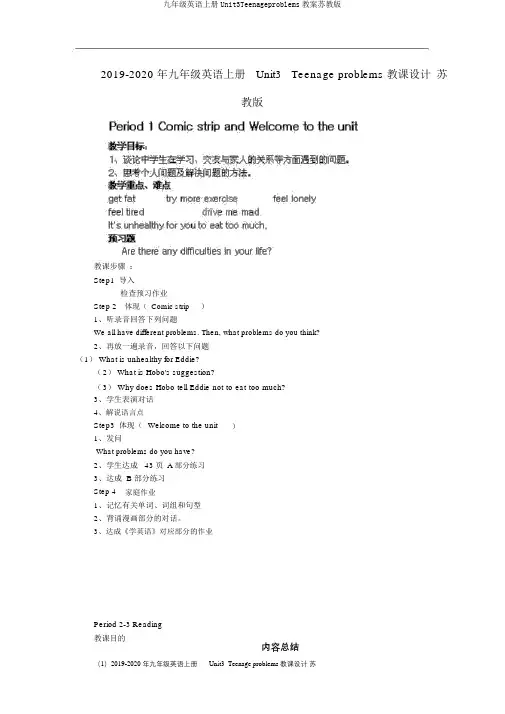
2019-2020 年九年级英语上册Unit3 Teenage problems 教课设计苏
教版
教课步骤:
Step1 导入
检查预习作业
Step 2体现(Comic strip )
1、听录音回答下列问题
We all have different problems. Then, what problems do you think?
2、再放一遍录音,回答以下问题
(1) What is unhealthy for Eddie?
(2) What is Hobo's suggestion?
(3) Why does Hobo tell Eddie not to eat too much?
3、学生表演对话
4、解说语言点
Step3 体现(Welcome to the unit )
1、发问
What problems do you have?
A 部分练习
2、学生达成43 页
3、达成 B 部分练习
Step 4 家庭作业
1、记忆有关单词、词组和句型
2、背诵漫画部分的对话。
3、达成《学英语》对应部分的作业
Period 2-3 Reading
教课目的
内容总结
(1)2019-2020 年九年级英语上册Unit3 Teenage problems 教课设计苏
教版。
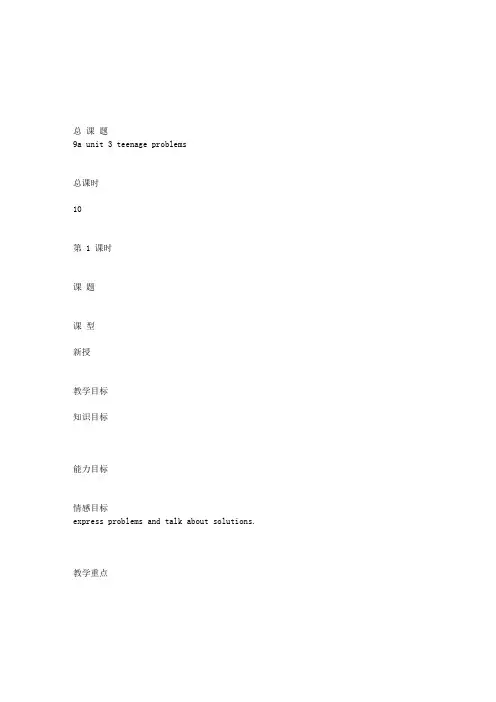
总课题9a unit 3 teenage problems总课时10第 1 课时课题课型新授教学目标知识目标能力目标情感目标express problems and talk about solutions. 教学重点教学难点express problems and talk about solutions. 课前预习教学过程教师活动学生活动备课札记listen and prepare for the questionthink about the usages of “get”从学生身边的话题谈起,引发学生思考并讨论。
引申get的不同含义,开展拓展性学习。
教学过程教师活动学生活动备课札记选用所给词组的适当形式填空: get a good mark, get some help from, get enough sleep, too noisy to studylonelyget的不同含义“noisy”and“quarrel”的用法区别.青少年学生常见的问题教学过程教师活动学生活动备课札记教学反思总课题9a unit 3 teenage problems 总课时10第2课时课题reading (a) 课型新授教学目标知识目标能力目标情感目标教学重点教学难点课前预习教学过程教师活动学生活动备课札记have a revision和同学们一起讨论属于他们自己的青少年问题教学过程教师活动学生活动备课札记遵循学生的思维规律,层层深入,同时注意阅读课的要旨是强调阅读,真正地达到提高学生的阅读能力.教学反思总课题9a unit 3 teenage problems 总课时10第3课时课题课型新授教学目标知识目标能力目标情感目标教学重点教学难点课前预习教学过程教师活动学生活动备课札记have a revision认识并理解与问题有关的词汇;学会表达情感。
教学过程教师活动学生活动备课札记认识并理解与问题有关的词汇;学会表达情感。
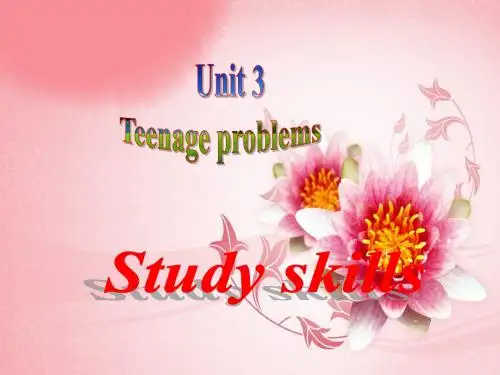
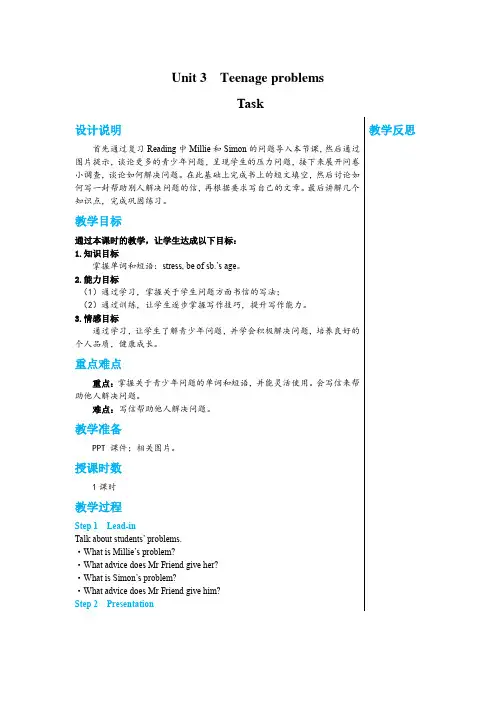
Unit 3 Teenage problemsTask设计说明教学反思首先通过复习Reading中Millie和Simon的问题导入本节课,然后通过图片提示,谈论更多的青少年问题,呈现学生的压力问题,接下来展开问卷小调查,谈论如何解决问题。
在此基础上完成书上的短文填空,然后讨论如何写一封帮助别人解决问题的信,再根据要求写自己的文章。
最后讲解几个知识点,完成巩固练习。
教学目标通过本课时的教学,让学生达成以下目标:1.知识目标掌握单词和短语:stress, be of sb.’s age。
2.能力目标(1)通过学习,掌握关于学生问题方面书信的写法;(2)通过训练,让学生逐步掌握写作技巧,提升写作能力。
3.情感目标通过学习,让学生了解青少年问题,并学会积极解决问题,培养良好的个人品质,健康成长。
重点难点重点:掌握关于青少年问题的单词和短语,并能灵活使用。
会写信来帮助他人解决问题。
难点:写信帮助他人解决问题。
教学准备PPT 课件;相关图片。
授课时数1课时教学过程Step 1 Lead-inTalk about students’ problems.·What is Millie’s problem?·What advice does Mr Friend give her?·What is Simon’s problem?·What advice does Mr Friend give him?Step 2 Presentation1. Show a list of pictures and ask them the questions:What is his problem? Can you give him some suggestions? Ask students to talk about their teenage problems.2. Present the new words by saying the sentence:Many of us have the problem of stress. How to deal with stress?Step 3 Task1. Do A.(1) Do a quiz and ask students to choose their answers and say the reason.(2) Check the answers.Answers: 1 c 2 c 3 a 4 c 5 c 6 a2. Do B.(1) Help Millie complete her email to Raymond.(2) Check the answers.Answers: (1) I think you should eat less and exercise more(2) Why not talk with your parents(答案不唯一)3. Talk about the structure of the letter.4. Show students the useful expressions and talk about how to use them.Step 4 Writing1. Write a reply telling your pen pal Andy how to deal with his problems.基本情况Andy,九年级学生喜好踢足球和弹钢琴烦恼父母工作忙,回家太晚;作业太多,经常熬夜,几乎无闲暇;被同学称为书呆子,常受到嘲笑。
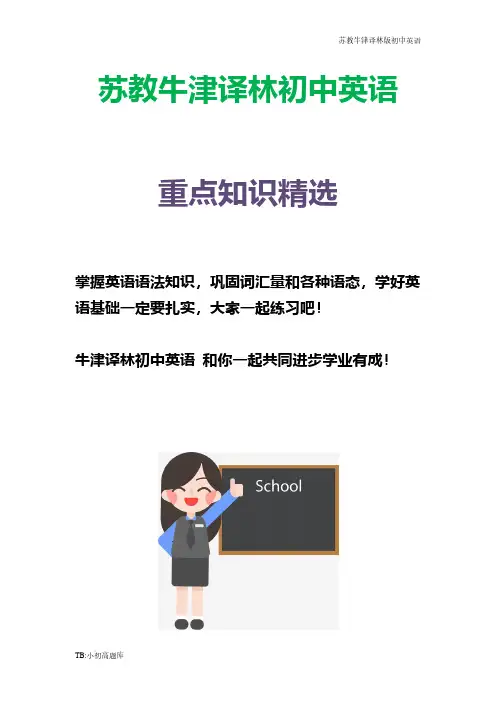
苏教牛津译林初中英语重点知识精选掌握英语语法知识,巩固词汇量和各种语态,学好英语基础一定要扎实,大家一起练习吧!牛津译林初中英语和你一起共同进步学业有成!Unit 3 Teenage problems总课题 9A Unit 3 Teenage problems 总课时10 第2课时课题Reading A课型新授知识目标:1. To get to know the main idea of the text; 2. To ask for advice;能力目标:To understand how to write about problems and to express 教学目标feelings.情感目标:To talk about students’ problems and to express feelings.教学重点The same as the aims.教(学)活动自主个案预习导学I.预习单词:deal with, offer, suggestion, valuable, value, support,achieve, balance, strict, worth, youth worker.II.在你的成长过程中,你会遇到许多问题,你的问题是什么?___________________________________________________________________III.Can you find them in the letters?Millie’s letter1. 如何处理问题2. 第二天3. 上交4. 按时5. 给我提供一些建议6. 心情糟透了7. 对我有价值8. 收到…的来信Simon’s letter1. 对……着了迷2. 我对足球的爱好3. 呆在外面4. 允许我在外面玩5. 对某人要求严格6. 在我们的爱好上花费一段时间7. 得到我父母的支持8. 达到学习和爱好两者之间的平衡教学过程Step 1 Sing an English song “If you are happy”Step 2 Presentation:1. Revise the problems in welcome to the unit.2. Ask the Ss the problems they have these days to pr esent new lesson.Step 3 Practising1. Listen to the tape and then tell “True” or “False” according tothe text.2. Let the students watch a flash and answer the following questions.Step 4 Doing ActivitiesStep 5 Discuss how to solve the problemsStep 6 Consolidation ExercisesStep 7 Homework 1. Read the text; 2. Finish off the exerci ses at page46-47.课内研讨Suppose you are Sigmund Friend. Can you give Millie and Simon some advice?To Millie: 1. _________________________ 2._________________________3. _________________________To Simon: 1. _________________________ 2. _________________________3. _________________________训练巩固 Fill in the blanks.Mi llie has lots of h . But she finds that she spends so much time d her homework, and she can’t find any time f______her hobbies. She can’t d how to solve the problem. She asksthe teacher to teach her how t o a a balance between the two.Simon would like some a on his love of football. He is so c about football that he s out late at night to play it. His parentsare very s with him and they want him to come home earlier. Simonfeels s and angry from time to time. He wishes he could havehis parents’ s .拓展延伸1. 我知道我需要按时交作业。
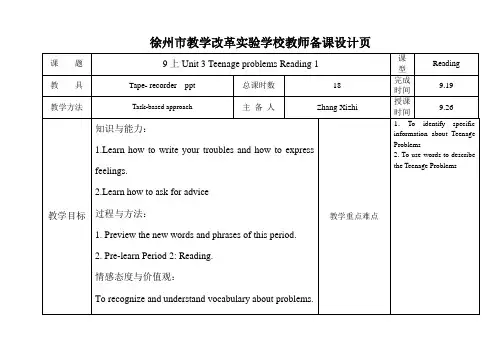
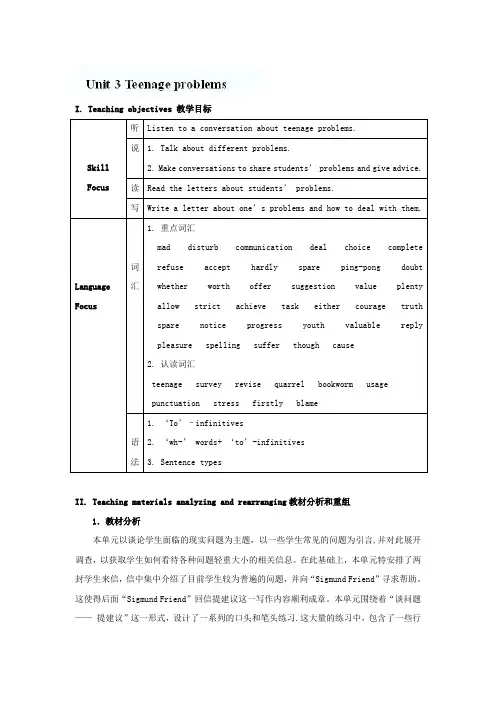
I. Teaching objectives 教学目标II. Teaching materials analyzing and rearranging教材分析和重组1.教材分析本单元以谈论学生面临的现实问题为主题,以一些学生常见的问题为引言,并对此展开调查,以获取学生如何看待各种问题轻重大小的相关信息。
在此基础上,本单元特安排了两封学生来信,信中集中介绍了目前学生较为普遍的问题,并向“Sigmund Friend”寻求帮助。
这使得后面“Sigmund Friend”回信提建议这一写作内容顺利成章。
本单元围绕着“谈问题——提建议”这一形式,设计了一系列的口头和笔头练习.这大量的练习中,包含了一些行之有效的处理问题的方法。
所以,学生在学到了相应知识的同时,提高了处理实际问题的能力。
而本单元的语法项目则是 1. ‘to’- infinitive (不定式) 2. ‘wh-‘ words+ ‘to’-infinitives (疑问词+动词不定式样) 3. Sentence types (句子类型,包括陈述句,疑问句,祈使句和感叹句)Welcome to the unit中的A部分以图片形式列举了学生生活中常见的问题。
(如没有充足的睡眠时间,没有足够的时间做作业,缺少好朋友等)。
同时呈现了一些新词汇,让学生进行图文匹配。
B部分是一项调查,要求学生把常见的问题根据个人实际情况按其大小进行排列。
Reading中的A部分是两篇学生的来信。
来信向我们展示了两位学生所遇到的困难并请求Sigmund Friend的帮助。
而B是对阅读文章中重点词汇的理解及运用。
C以记录表的形式,考查学生对两封书信总体意思的理解和把握。
而D则是对来信所作的回复。
该环节的设计,不仅再一次巩固了A的内容,也是对学生的一次写作训练。
Vocabulary向学生介绍单词get的一词多义性。
其中A要求学生用其他所提供的单词来替换get,使学生初步了解get的多层含义。
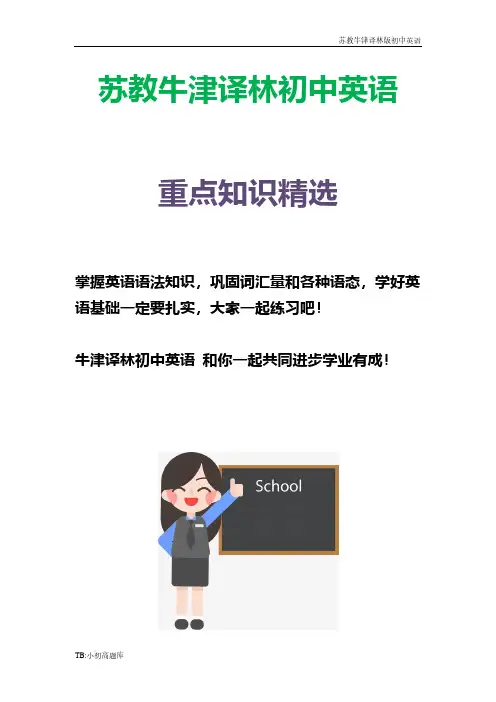
苏教牛津译林初中英语重点知识精选掌握英语语法知识,巩固词汇量和各种语态,学好英语基础一定要扎实,大家一起练习吧!牛津译林初中英语和你一起共同进步学业有成!Unit 3 Teenage problemsTo make a wTo write a letter about stress problemas the aims3. They didn’t arrive at a______ (4. Thetalk toWe have known some ways to deal with the stress, but what’s the causendProblem 1: Can’t find enough ti me to do the t hing they want to do.Cause: homeworkSolution: plan aheadProblems 2: My pen friend doesn’t reply to my e – mails.Cause: busySolution: Send an e-card to her / himProblems 3: Not goo d at sport, can’t run fast, hate swimmingCause: ?Solution: Practice more.Homework1.Review the expressions in the passage.2.Do some more cons olidation exercises.3.Write a letter to express stress among teenagers.课内研讨词组翻译1.嘲笑某人_____________________2. 对某人大叫 ____________________3.不注意… _____________________4. 担心 ____________________5.实际上 ____________________6.主要原因 ______________________7. 解决问题的方法______________________8.更仔细地计划自己的时间__________________________________训练巩固拓展延伸请根据短文意思和首字母提示填入适当的单词。
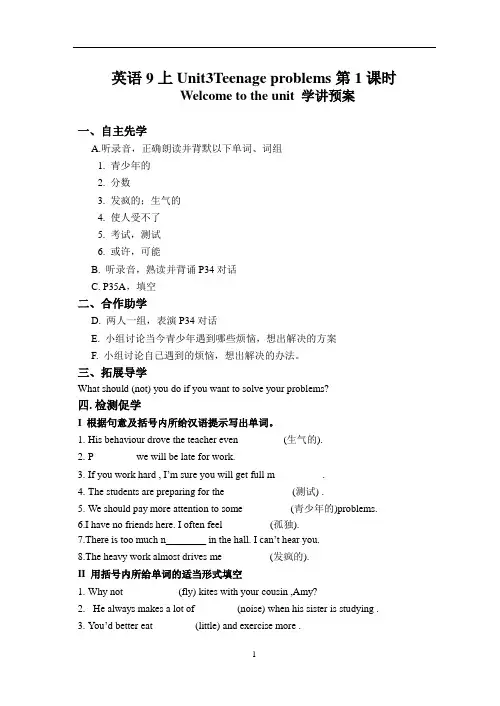
英语9上Unit3Teenage problems第1课时Welcome to the unit 学讲预案一、自主先学A.听录音,正确朗读并背默以下单词、词组1. 青少年的2. 分数3. 发疯的;生气的4. 使人受不了5. 考试,测试6. 或许,可能B. 听录音,熟读并背诵P34对话C. P35A,填空二、合作助学D. 两人一组,表演P34对话E. 小组讨论当今青少年遇到哪些烦恼,想出解决的方案F. 小组讨论自己遇到的烦恼,想出解决的办法。
三、拓展导学What should (not) you do if you want to solve your problems?四.检测促学I 根据句意及括号内所给汉语提示写出单词。
1.His behaviour drove the teacher even ________ (生气的).2.P________ we will be late for work.3.If you work hard , I’m sure you will get full m_________ .4.The students are preparing for the ___________ (测试) .5.We should pay more attention to some _______ (青少年的)problems.6.I have no friends here. I often feel _________(孤独).7.There is too much n________ in the hall. I can’t hear you.8.The heavy work almost drives me_________ (发疯的).II 用括号内所给单词的适当形式填空1.Why not __________ (fly) kites with your cousin ,Amy?2.He always makes a lot of________ (noise) when his sister is studying .3.You’d better eat________ (little) and exercise more .4.Mr. David doesn’t have enough time________ (play) with his son .lie doesn’t have any close friends____________ (talk) to.III单项选择1. —Have you finished _________the story book?—Yes, I have.A. to readB. readC. readingD. reads2. Don’t worry, sir. I’m sure I can run _________to catch up with them.A. fast enoughB. enough fast C .slowly enough D. enough slowly3. At the foot of the hill you could hear nothing but the _______of the running water.A. shoutB. noiseC. voiceD. sound4. To our disappointment(失望), the pool was_______for the whole time during our stay.A. closedB. openC. cleanD. gone5. The old man lives in a ____town. He lives _____, but he doesn’t feel______.A. alone, alone, alone B alone, alone, lonelyC. lonely, alone, lonelyD. lonely, lonely, alone6.The ________ is that I can’t answer the ________.A. problem; questionB. problem; problemC. question; questionD. question; problem7.You should take more________ .Don’t always be at the desk busy doing your________ .A.exercise ; exerciseB.exercises ;exercisesC. exercises ;exerciseD. exercise ;exercisesIV. 根据汉语完成句子1.Amy is asking for___________________________________(怎样解决他的问题的建议)。
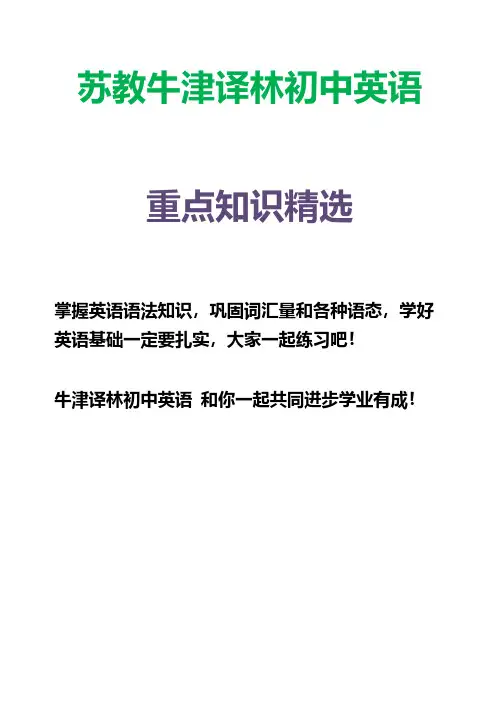
苏教牛津译林初中英语重点知识精选掌握英语语法知识,巩固词汇量和各种语态,学好英语基础一定要扎实,大家一起练习吧!牛津译林初中英语和你一起共同进步学业有成!Teenage problems班级 姓名 备课组长【学习目标】1. to talk about problems and their causes2. to think about personal problems and how to deal with them.【重点、难点】1. 掌握四会词汇。
2. 初步了解宾语从句【课前预习】翻译词组1. 足够的睡眠_________________________2. 电视一直开着________________________3. 没有亲密的朋友________________________4. 感到孤独________________________5. 使----发疯________________________6. 有太多的测验________________________7. 考试得分低________________________8. 吃得太多________________________【学习过程】step1Presentation T :I m very happy today , beause I … Are you happy today (Yes, … Are you happy every day?) Step 2教师“个备”或学生笔记栏Skills T shows the pictures:Today I will show you some pictures of thestudents in Class 1, Grade 9. Can you tell me t heir problems?,Step3Exercises T:We have some sentences under each picture on Page 43Can you finish them now?1. I don’t get enough ________. I feel tired in class.2. I don’t have enough time to do my __________.3. The TV is always on at my home. The ________ almost drives me mad.4. I don’t have any close __________ to talk to. Sometimes, I feel lonely. 5My cousin always makes a lot of noise and _________ me when I’mstudying.6. My ___________ work al l day. They don’t have time for me.Step4Discussion T:Now, we know more problems. In Part B you can see all ofthem Can you discuss in groups a nd write 1----5 next to each problem thentell us your idea?lessons we will find more students who have the same problems with us. At the same time, we will find ways to solve our problems.Step 5Presentations T:You ‘v e done a good job. You know that everyone has theri problems. Then, how about our old friend Eddie. Let’s listen to the tape and answer the questions. 1. What’s Eddie’s problem? 2. What’s Hobo’s advice?(建议) 3. What’s Eddie’s new problem?Step 6Exercise【当堂训练】根据句意和中文提示写出单词。
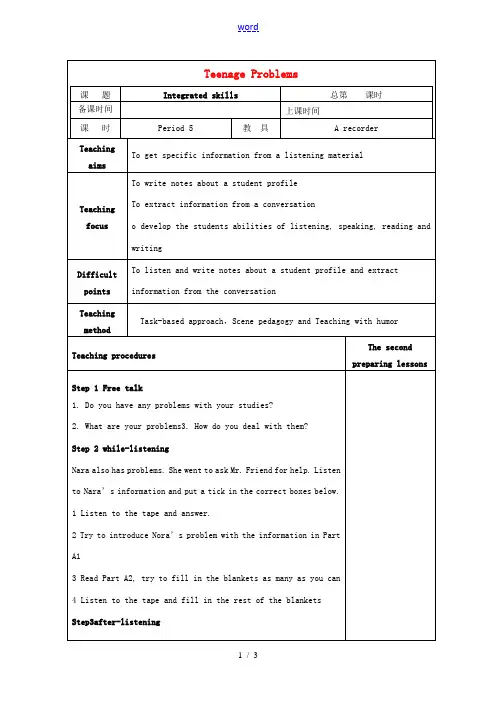
Unit 3 Teenage problemsWelcome to the unitTeaching aims:1. Talk about middle school students in dating, learning, the relationship withthe family problem.2. Think about personal problems and the methods to solve the problem. Teaching procedures:Step 1 Free talkSay some problems these students have in the following pictures1.This student is being scolded by his father.2.They have a lot of homework to do.3.This student is overweight/too fat.4.This student is not very good at running.5.He is being laughed at.Step 2 PresentationLearn some new words.Step 3 Different problems1. Some students in Class 1, Grade 9 have problems. Look at the pictures. What problems do they have? Complete the sentences with the words in the box.Keys: I don’t get enough sleep. I feel tired in class.I don’t have enough time to do my homework.The TV is always on at my home. The noise almost drives me mad.I don’t have any close friends. Sometimes I feel lonely.Sometimes I get low marks in exams. I feel sad.My parents work all day. They don’t have time for me.2. Millie is talking with her mum about teenage problems. Work in pairs and talk about your problems. Use the conversation below as a model.Millie: Mum, many of my classmates have problems.Mum: Really? How about you? Do you have any problems?Millie: Yes, I do. Sometimes I feel sleepy in class.Mum: Oh dear. You don’t get enough sleep.Millie: What should I do then?Mum: Perhaps you should manage your time better and go to bed earlier.Millie: OK. I’ll try.Step 4 Watch a video about Hobo and Eddie.Read and answer the questions.1. What problem does Eddie have?2. What is unhealthy for Eddie?3. What is Hobo’s suggestion?4. Why does Hobo tell Eddie not to eat too much?Step 5 language points1.You eat too much.too much 太多,修饰不可数名词too many 太多,修饰可数名词much too 太……,修饰形容词e.g. Don’t eat ________ ice cream.There are ________ books on the desk.Lily is ________ fat.2. The TV is always on at my home.我家的电视总是开着。
教学设计|九年级上册Unit 3 Teenage problems Task教学反思本节课教学内容为九年级上册Unit 3 Teenage problems Task,话题为Stress among teenagers,该话题属于“人与自我”这一主题范畴。
本节课创设贴近学生的语言情境,通过共同设计名为Teenagers的电子杂志,引导学生在真实的生活情境中展开多元创新的英语语言学习活动。
首先,利用进行互动展示,同时用问卷星收集并展示学生学习和生活中遇到的常见问题,学生能共同探究青春期压力的成因。
其次,在授课过程中使用智慧课堂交互设备,学生通过电子手写板进行在线随堂测验,习得应对青春期问题的正确方法。
再次,通过智慧课堂交互设备和小组合作学习工坊,学生针对青春期问题头脑风暴出有价值的建议,并将小组成果通过手写板即时展示在智慧大屏上进行分享。
一、创设情境,活动导入师生共同设计名为Teenagers的电子杂志,学生能在真实的生活情境中展开多项英语语言学习活动。
学生使用手写板完成填空练习,每位同学的回答都可以直接在智慧大屏上实时展现。
一方面可以观察并快速掌握每位学生的课堂作答情况,另一方面也可通过大屏展示并讲解学生的精妙回答及易错点。
学生点击手写板上的按钮进行抢答,也激发了学生的课堂参与热情。
二、问卷调查,成因分析通过扫描,学生把自己看到的关于青春期问题的图片信息介绍给大家,并向学生描述,其他学生猜。
通过扫描可以有效地实时隐藏和显示所包含的信息。
利用互动可以激发学生的探索欲望,增强问题的神秘感。
采用问卷调查的方式收集和展示学生学习生活中的共性问题,利用学生自身的真实数据进行分析,共同探讨青少年压力产生的原因,贴近学生生活实际。
学生还可以在图表分析的过程中获得信息数据收集和处理的技能,为学生未来的专业研究铺平道路。
三、在线测验,习得方法教师通过智慧课堂交互系统发布选择题,学生通过电子手写板上的A、B、C、D选项按键进行在线随堂测验,教师可以在智慧大屏上即时统计并展示学生选择的结果。
9A Unit 3 Teenage problems (Period1)Designed by Ma JianfengRugao Experimental Junior Middle SchoolPart 1 Analysis of the Teaching MaterialSTATUS AND FUNCTION 教材的地位与作用This is the introduction about teenage problems. It’s helpful to enhance the stude nts’ awareness of the need to solve teenage problems, try to live peacefully with others because we live in the same world.TEACHING AIMS AND DEMANDS 教学目标与要求(1)Knowledge objects1. Let the students get to know teenage problems.2. To make the students know the importance of solving teenage problems.3. To make the students know how to solve the problems and make the worlda better place for all.TEACHING AIMS AND DEMANDS 教学目标与要求(2)Ability Objects4. To improve students’ ability of getting informati on through reading.5. To develop students’ ability of expressing their own opinions in English. TEACHING AIMS AND DEMANDS 教学目标与要求(3)Moral Objects6.To enhance the awareness of the need to solving teenage problems.7.To encourage the students to be youth workers, and do good deeds to help the others, make the world full of love, just like 2008Beijing---One World, One Dream.TEACHING DIFFICULTIES 教学的难点1.The understanding of some sentences. e.g.:It’s unhealthy for you to eat too much.My cousin alwa ys makes a lot of noise and disturbs me when I’m studying.2.The students use their own words to express their own ideas.Part 2 Teaching Methods1. Multimedia Computer Assisted Instruction2. Elicitation Method3. Communicative Approach4. Task ApproachPart 3 Learning Methods1). To analyze and solve the problems on the students’ own.2). To get information through watching, reading and listening.3). To be able to guess the meaning of some words and sentences in the reading material with the tea cher’s help.Part 4 Teaching ProceduresStep 1 Warming upEnjoy a short piece of music.Step 2 Presentationa. Watch a short flash about a little girl with teenage problems.b. Welcome the students to apply for the youth workers.c. Tell the students to pass three levers if they want to be successful.Step 3 Level OneEddie’s problems (Comic strips)a. Ss listen to the tape.b. Ss answer three questions.c. Practice and act them out.d. Make a dialoguee. Tell the Ss they have passed the first level. (if they are good enough)Step 4 Level TwoTeenage problems (Welcome to the unit)a. Look at the pictures and complete the sentences.b. Deal with the sentences one by one.c. Some new words and difficult sentencesc. Ss read the three sentences.d. Ss give some advice according to these problems.e. Ss give more sentences about teenage problems.f. Page 43 on the Ss’ book, fill in the blanks of part A.g. Tell the Ss they have passed the second level. (if they are good enough) Step 5 Level ThreeYour advice and our hope for the worlda. Do a survey in the class. (Which problem do you think is the biggest problem?)b. How to solve the problems? Ss talk with partners and then make up a dialogue in pairs.c. Some background about teenagers’ opinions.d. Encourage more people to be youth workers to solve teenage problems (Topic: If you want to be a youth worker, what can you do to solve teenage problems?)e. Ss present their advice.f. T presents his own opinion.g. Let our dreams become true.e. 2008---One World, One Dream.Step 6 Certificatea. Ss have passed three levels, give a conclusion.b. Give the certificate to the monitor and ask all the Ss to support from now.c. China---a happy big family; 2008---One World, One Dream.Part 5 Layout on the blackboardTeenage ProblemsPart 6 HomeworkOral work: Try your best to say something about teenage problems.Written work: Finish Ss book on p31-32.Group work: Discuss(讨论) in groups and make a project(课题) about teenage problems.。
苏教牛津译林初中英语重点知识精选掌握英语语法知识,巩固词汇量和各种语态,学好英语基础一定要扎实,大家一起练习吧!牛津译林初中英语和你一起共同进步学业有成!《Unit 3 Teenage problems》总课题9A Unit3 总课时10 第5 课时课题Grammar A 课型新授教学目标知识目标To use ‘wh’-words + ‘to’-infinitive to talk about problems教学重点能力目标To learn and distinguish different types of sentences Teaching Procedures教学难点The same as the aims.教(学)过程教(学)活动自主个案预习导学用所给词的适当形式填空。
1. Simon does not know what ________ (do).2. Sandy wants to know where________ (ask) for advice.3. Millie does not know how __________(solve) her problems.4. Simon just forgot when _________ (meet) his friends.5. Paul knows who ___________ (talk) to for hel p.教学过程Teaching steps:Step 1 Presenting (Part A)Step 2 PracticingStep 3 Presenting (Part B)Ask students to give examples:(疑问句:一般疑问句、特殊疑问句、反义疑问句、选择疑问句,陈述句分成肯定和否定,感叹句由感叹词 what / how 引导,祈使句也可分成肯定和否定两种形式。
)Step 4 Practicing1. I will ask students to finish the exercises on page 50.2. I will ask students to give some more examples.Step 5 Consolidation ExercisesStep 6 Doing Homework1. Revi ew the gramm ar we learned today.2. Do some more consolidation exercises.课内研讨选词填空。
Unit3 Teenage problems教学步骤:Step1 导入检查预习作业Step 2 呈现(Comic strip)1、听录音回答问题We all have different problems. Then, what problems do you think?2、再放一遍录音,回答以下问题(1)What is unhealthy for Eddie?(2)What is Hobo's suggestion?(3)Why does Hobo tell Eddie not to eat too much?3、学生表演对话4、解释语言点Step3 呈现(Welcome to the unit)1、提问What problems do you have?2、学生完成43页A部分练习3、完成B部分练习Step 4 家庭作业1、记忆相关单词、词组和句型2、背诵漫画部分的对话。
3、完成《学英语》对应部分的作业Period 2-3 Reading教学目标1、学习如何写出自己的烦恼及如何表达情感2、学习如何向别人寻求建议。
教学重点、难点deal with stay up late hand in hear from plenty of on time be of great value crazy aboutstay out late allow sb. to do it from time to time achieve a balanceI have no choice but to do it.I hardly have any space time for my hobbies such as pla ying volleyball and ping-pong.I often doubt whether it is worth working so hard.Can you offer me some suggestions?My dream is to be a great fo otball player.I believe it is important for us to spend some time on our hobbies/Can you please advise me how to achieve a balance between my schoolwork and my hobbies?预习作业Do you have any hobbies? Do you have enough time for your hobbies?教学步骤Step 1 导入检查预习作业Step 2 呈现1、播放第一部分的录音,了解书信的大意。
2、再次播放录音内容,回答以下问题:(1)What problem does Millie have?(2)Why does Millie accept to do so much work although she does not want to?(3)Does Millie have any hobbies? What are they?(4)What do you think of her problem? Can you offer her some advice?3、学生大声朗读该部分课文,完C部分练习4、播放第二部分录音,了解这三个段落的内容,并回答以下问题:(1)When does Simon play football?(2)How do his parents think about it?(3)Does Simon agree with his parents?Step 3 活动1、根据以下表格,谈论Million 和 Simon的苦恼。
Step 4 呈现1、解释课文中的重点及难点2、完成46页B部分练习3、连接下列同义词或反义词go home adviceearlier latersuggest rememberforget about stay out4、完成47页D部分练习Step 5 反馈练习Step 6 家庭作业1、记忆相关词汇、词组及句型。
2、根据Million和Simon的来信内容口头作文,说说自己的烦恼。
3、完成《学英语》对应部分的作业。
Period 4 Vocabulary教学目标1、进一步复习巩固get作为实意动词和系动词的用法。
2、用动词get谈论问题。
教学重点get/take a bus get/become angryget/achieve a high mark get/ have a lot of homework get/ arrive home late get/ receive a lettera lot of traffic预习作业1、回忆有关get的词组教学步骤Step1导入(1)检查预习作业(2)回答以下问题:① Do you have enough time to take up your hobbies?② Do you have lots of homework every day?③ Are your parents very strict(严格) with you?Step2练习⑴完成48页A部分练习,并分清get是实意动词还是系动词。
⑵完成B部分练习⑶请三位同学朗读完成后的短文,全班核对答案。
Step3 家庭作业(1)记忆相关词汇、词组和句子。
(2)完成《学英语》对应部分的作业Period 5-6 Grammar教学目标1、总结归纳动词不定式的用法。
2、用特殊疑问词+to不定式来谈论问题。
3、学习四种句子结构。
教学重点难点make me laugh to tell you the truthspare some time for me care aboutLinda came back home to find he house on fire.Paul knows who to talk to her help.Simon knows who to talk to for help.Simon does not know what to do.You should decide which to do first.Simon just forget when to meet his friends.Sandy wants to know where to ask for advice.Millie does not know how to solve her problems.预习作业动词不定式教学步骤Step1 呈现(1)检查预习作业(2)解读49页A部分的说明文字。
(3)在Reading部分画出所有不定式,并说出不定式所作成分。
(4)可省略to的动词不定式如:make, let, have, see, hear, notice 等,但这些动词被用在被动语态中时to不能省略。
Step2 练习(1)完成50页A1部分的练习(2)朗读对话(3)完成50页A2部分的练习(4)请学生分别扮演Suzy,Daniel,Amy等人说出自己的苦恼Step3 呈现疑问词(如what, which, when, where, who, how)加动词不定式可放在某些动词(如know, remember, forget, decide)后作宾语。
如:I don’t know how to do.Step4 练习1、完成51页练习2、学生朗读该段对话。
3、单项选择:1)They have decided to go to Daniel for their holiday, but we havenot decided ______ yet.A when to goB what to do itC how to goD when to go2)Don’t forget ______ your lovely daughter here next time.A to bringB to takeC takingD bringing3)I found ____ very difficult to learn French well.A ThatB itC \D myself4)Would you please ____ in the library?A not to talkB don’t talkC not talkD aren’ttalking5)She has already keyed in her user name and pass word, but shedoes not know ____ next.A what to doB how to doC what should she doD how she should doStep5 呈现1、讲解句子的分类表Step6练习1、完成53页的练习。
2、完成以下练习:⑴ There is some milk in the bottle.(改为否定句)⑵ Sandy has long hair.(用what改为感叹句)⑶ You must be kind to the elderly.(改为祈使句)⑷ You mustn’t play with fire.(改为祈使句⑸ I think he will come.(改为否定句)⑹ he works very hard.(用how改为感叹句)⑺ You dislike this kind of books.(改为反义疑问句)⑻ Be quiet.(改为反义疑问句)Step7家庭作业1、记忆相关词汇、词组和句型2、完成《学英语》对应部分的作业Period 7 Integrated skills教学目标1、从学生的情况介绍中获得信息并作记录。
2、从对话中获取信息。
3、完成一份访问记录。
4、学会谈论个人问题及提供建议。
教学重点难点the top student laugh at share your problems with herpay no attention to be proud of reply toI’m afraid she doesn’t want to write to me any more.I’m sure that’s not true.Why don’t you send an e-card to her and let her know you miss her very much?My pleasure.预习作业Do you think the top student has any problems?教学步骤Step1 导入检查预习作业Step2 呈现1、看课文中Sue的简介回答问题:What information should a student’s profile include?2、朗读Sue的简介,完成54页A1部分有关Sue的笔记。